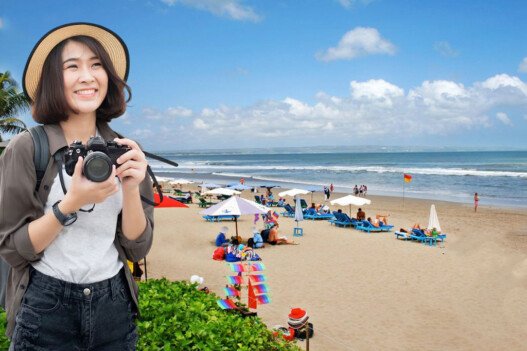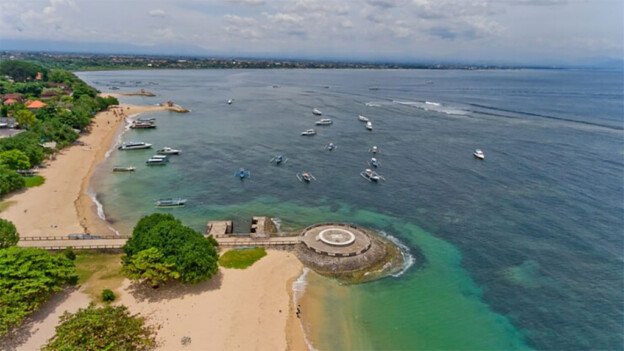A Complete Guide to Budgeting Your Island Paradise Dream
Bali has long captured the imagination of digital nomads, retirees, and adventure-seekers worldwide. With its stunning landscapes, rich culture, and relatively affordable cost of living, the Island of the Gods seems like the perfect escape from the high-stress, high-cost lifestyle of Western countries. But what does it really cost to live in Bali as an expat? Beyond the Instagram-worthy sunsets and açai bowls lies a complex web of expenses that can either make or break your tropical dreams.
After extensive research and conversations with long-term expats across the island, this comprehensive guide breaks down the real costs of living in Bali, from budget backpacker to luxury lifestyle, helping you make an informed decision about whether paradise is within your reach.
🏠 Housing: Your Home Base in Paradise
Housing represents the largest expense for most expats in Bali, and costs vary dramatically depending on location, style, and amenities. The key is understanding the different options available and their respective price points.
Kost and Shared Accommodations ($150-400/month)
For budget-conscious expats, especially younger digital nomads, kost (Indonesian boarding houses) and shared villas offer the most affordable options. These typically include basic furnishing, Wi-Fi, and sometimes meals. Popular areas like Canggu and Ubud offer numerous co-living spaces specifically designed for international residents, fostering community while keeping costs low.
Private Rooms and Studios ($300-800/month)
A step up in privacy and comfort, private rooms in shared villas or small studio apartments provide independence while remaining affordable. These often include kitchen access, private bathrooms, and dedicated workspace areas—essential for remote workers. Locations like Sanur, Denpasar, and parts of Ubud offer excellent value in this category.
One-Bedroom Apartments ($500-1,200/month)
For those seeking complete independence, one-bedroom apartments and small houses provide privacy and space. Modern complexes in areas like Seminyak, Berawa, and central Ubud offer Western-style amenities including air conditioning, modern kitchens, and reliable internet. Prices increase significantly in prime beachfront locations.
Luxury Villas and Premium Properties ($1,200-5,000+/month)
At the top end, Bali offers stunning luxury accommodations that would cost significantly more in major Western cities. These properties often include private pools, garden spaces, housekeeping services, and prime locations. Popular among successful entrepreneurs, retirees with substantial savings, and those working for international companies with housing allowances.
Hidden Housing Costs
Beyond rent, consider additional expenses: utilities (electricity can be expensive with air conditioning), water, internet upgrades for reliable speeds, security deposits (typically 1-3 months), and agent fees. Many expats also invest in furnishing and personalizing their spaces, adding $500-2,000 to initial setup costs.
🍜 Food: From Warungs to Fine Dining
Bali’s food scene offers incredible diversity, from traditional Indonesian cuisine to international fare catering to expat tastes. Your food budget largely depends on dining preferences and cooking habits.
Local Indonesian Food ($2-8/meal)
Traditional warungs (local eateries) serve authentic Indonesian dishes at incredibly affordable prices. Nasi gudeg, mie ayam, and gado-gado provide filling, flavorful meals for under $3. Street food vendors offer even cheaper options, though food safety considerations may apply for some expats adjusting to local cuisine.
Western and International Cuisine ($8-25/meal)
Restaurants catering to international tastes charge premium prices for familiar foods. Pizza, burgers, pasta, and other Western dishes typically cost 3-5 times more than local equivalents. Popular expat areas like Seminyak and Canggu have extensive international dining scenes, but frequent dining out significantly impacts budgets.
Groceries and Cooking at Home ($100-300/month)
Shopping at local markets offers the best value for fresh produce, while supermarkets like Bintang and Pepito stock imported goods at higher prices. Cooking at home provides substantial savings, though imported ingredients for Western cooking can be expensive. Many expats adopt hybrid approaches, incorporating local ingredients into familiar recipes.
Specialty Items and Imported Foods
Cheese, wine, specialty grains, and other imported items carry significant markups. A bottle of decent wine costs $15-30, while quality cheese runs $8-15 per pound. Expats with specific dietary requirements or strong preferences for imported foods should budget accordingly.
🛵 Transportation: Getting Around the Island
Transportation costs in Bali depend heavily on personal preferences and lifestyle choices. The island’s traffic congestion and limited public transportation make personal transportation almost essential for most expats.
Motorbike Rental and Ownership ($30-100/month)
Motorbikes represent the most common and economical transportation for expats. Monthly rentals cost $30-60, while purchasing a used bike requires $500-1,500 upfront plus registration and insurance. Fuel costs approximately $20-40 monthly for regular commuting. However, consider safety equipment, maintenance, and potential accident costs.
Car Rental and Ownership ($200-600/month)
Cars provide safety and comfort but at significantly higher costs. Monthly rentals range from $200-400, while purchasing requires $3,000-15,000 depending on vehicle type and condition. Additional costs include insurance, parking fees, and higher fuel consumption. Essential for families or those uncomfortable with motorbike transportation.
Ride-Sharing and Taxis ($100-300/month)
Gojek and Grab offer convenient ride-sharing services, while traditional taxis remain available. Regular users can expect monthly costs of $100-300 depending on usage frequency and distance traveled. More expensive than personal transportation but eliminates ownership responsibilities and parking concerns.
Public Transportation and Walking
Limited public transportation exists, primarily bemos (shared minibuses) serving local routes at very low costs. Walking is feasible in some areas like central Ubud or beachfront Seminyak, but Bali’s sprawling layout and tropical heat make it impractical for most daily transportation needs.
🏥 Healthcare: Staying Healthy in Paradise
Healthcare represents a crucial consideration for expats, with costs varying dramatically between local and international standard facilities.
International Health Insurance ($50-300/month)
Comprehensive international health insurance provides peace of mind and access to quality healthcare. Policies range from basic coverage to comprehensive plans including emergency evacuation. Many expats consider this essential, particularly those with pre-existing conditions or families with children.
Local Healthcare Facilities ($5-50/visit)
Public healthcare centers (Puskesmas) and local clinics offer basic services at very affordable rates. Routine consultations cost $5-20, while basic medications remain inexpensive. However, language barriers and varying quality standards may pose challenges for some expats.
International Standard Hospitals ($50-500+/visit)
Private hospitals like BIMC and Siloam provide international-standard care with English-speaking staff. Consultation fees range from $50-150, while procedures and treatments cost significantly more. Emergency services and specialized treatments can reach thousands of dollars without insurance.
Preventive Care and Wellness
Bali’s wellness culture offers affordable options for preventive care. Massage therapy, yoga classes, and alternative treatments cost fraction of Western prices. Many expats incorporate these into regular health routines, potentially reducing long-term healthcare costs through prevention.
🎯 Lifestyle and Entertainment: Living the Dream
Entertainment and lifestyle costs vary enormously based on personal preferences and social habits. Bali offers options for every budget and interest.
Beach Clubs and Nightlife ($20-100/night)
Bali’s famous beach clubs and nightlife scene can quickly consume budgets. Cover charges, drinks, and food at popular venues like Potato Head or Ku De Ta cost Western prices. Regular partying can easily add $200-800 monthly to expenses, while occasional indulgence remains more manageable.
Fitness and Wellness ($30-150/month)
Gym memberships range from basic local facilities ($15-30/month) to premium international chains ($80-150/month). Yoga studios offer class packages for $50-100 monthly, while personal trainers cost $15-40 per session. Many expats find wellness activities more affordable than home countries.
Hobbies and Activities ($50-300/month)
Surfing lessons, cooking classes, cultural tours, and adventure activities provide rich experiences at reasonable costs. Many activities cost $20-50 per session, making regular participation feasible for most budgets. Language classes, art workshops, and skill development opportunities add value beyond entertainment.
Travel and Exploration ($100-500/month)
Bali’s central location makes regional travel attractive and affordable. Weekend trips to neighboring islands or countries cost $100-500 depending on destination and style. Many expats budget monthly travel allowances to explore Southeast Asia’s incredible diversity.
💼 Visa and Legal Costs: Staying Legal
Visa requirements and associated costs represent ongoing expenses for all expats living in Bali long-term.
Visit Visa and Extensions ($35-500/month)
Visit visas allow 30-day stays with possible extensions, costing approximately $35 initially plus $45 for extensions. Frequent border runs to reset visa status add travel costs and time. Some expats use this method short-term, but it becomes expensive and inconvenient for long-term residence.
Social/Cultural Visa (B211) ($150-350/application)
Social visas allow 60-day stays extendable twice for additional 30-day periods, providing up to 180 days total. Initial applications cost $150-200, with extensions adding $45-50 each. Agent fees may add $100-150 for application assistance and processing.
Business and Investment Visas ($1,000-5,000/year)
Business visas require sponsor companies and substantial documentation, while investment visas require minimum investments of $35,000-130,000 depending on business type. Annual costs include visa fees, agent services, and maintaining compliance requirements.
Kitas and Long-term Residence ($800-2,000/year)
Kitas (residence permits) provide longer-term legal status but require sponsorship through marriage, business, or investment. Annual costs include permit fees, agent services, and maintaining sponsor relationships. Multi-year permits offer better value for committed long-term residents.
🌐 Internet and Technology: Staying Connected
Reliable internet represents a crucial expense for digital nomads and remote workers, with quality varying significantly across locations and providers.
Home Internet ($20-80/month)
Basic home internet packages start around $20 monthly for speeds adequate for general use, while premium packages offering higher speeds and reliability cost $50-80. Many expats invest in backup connections through mobile hotspots to ensure consistent connectivity for work.
Mobile Phone Plans ($10-30/month)
Indonesian mobile plans offer excellent value with generous data allowances. Unlimited plans cost $15-25 monthly, while pay-as-you-go options provide flexibility for lighter users. International roaming charges can be expensive, making local SIM cards essential for extended stays.
Coworking Spaces ($50-150/month)
Professional coworking spaces offer reliable internet, professional environments, and networking opportunities. Day passes cost $8-15, while monthly memberships range from $50-150 depending on location and amenities. Many digital nomads find the investment worthwhile for productivity and social connections.
Technology Purchases and Maintenance
Electronics cost more in Indonesia due to import duties and limited selection. Laptops, phones, and other technology items typically cost 20-40% more than US or European prices. Repair services are available but quality varies, making device protection and backup plans important.
📊 Sample Monthly Budgets: Three Lifestyle Approaches
Budget Backpacker Lifestyle ($600-900/month)
- Housing: Shared accommodation or kost ($200-350)
- Food: Primarily local cuisine with occasional Western meals ($150-250)
- Transportation: Motorbike rental ($40-60)
- Healthcare: Basic local coverage ($20-50)
- Entertainment: Limited nightlife, free activities ($50-100)
- Miscellaneous: Visa, phone, internet ($100-150)
This budget requires disciplined spending and cultural adaptation but provides authentic Indonesian experiences and strong community connections through shared living arrangements.
Comfortable Mid-Range Lifestyle ($1,200-2,000/month)
- Housing: Private apartment or small house ($600-900)
- Food: Mix of local and international cuisine ($250-400)
- Transportation: Motorbike ownership or occasional car rental ($80-150)
- Healthcare: International insurance and quality care ($100-200)
- Entertainment: Regular dining out, occasional beach clubs ($200-400)
- Miscellaneous: Better internet, hobbies, travel ($200-350)
This range provides comfort and flexibility while maintaining reasonable costs, suitable for most digital nomads and early retirees.
Luxury Expat Lifestyle ($3,000-6,000+/month)
- Housing: Premium villa or luxury apartment ($1,500-3,000)
- Food: Fine dining and imported groceries ($500-800)
- Transportation: Car ownership and driver services ($300-600)
- Healthcare: Premium insurance and private care ($200-400)
- Entertainment: Beach clubs, fine dining, premium activities ($500-1,000)
- Miscellaneous: Premium services, frequent travel ($400-800)
This lifestyle provides Western-standard comfort and convenience while taking advantage of Bali’s lower costs compared to major international cities.
🚨 Hidden Costs and Unexpected Expenses
Rainy Season Challenges
Bali’s rainy season brings unique expenses often overlooked in budgeting. Flooding can damage electronics and belongings, while increased humidity requires more air conditioning use. Transportation becomes more expensive during heavy rains, and some activities become unavailable, potentially increasing indoor entertainment costs.
Cultural and Religious Obligations
Living in Bali means participating in local culture, which involves expenses for temple donations, ceremony contributions, and appropriate clothing. While amounts are typically small ($5-20), frequency can add up, and participation strengthens community relationships.
Banking and Financial Services
International banking can be expensive with foreign transaction fees, ATM charges, and poor exchange rates. Many expats open local bank accounts, but this requires significant documentation and minimum balances. Money transfer services like Wise offer better rates but still involve costs.
Seasonal Price Fluctuations
High season (July-August, December-January) brings significant price increases for accommodation, dining, and activities. Many services double or triple prices during peak periods, while availability decreases. Long-term residents learn to adjust spending patterns around these seasonal fluctuations.
💡 Money-Saving Tips from Long-Term Expats
Embrace Local Culture and Cuisine
The fastest way to reduce costs involves embracing Indonesian culture and cuisine. Learning basic Bahasa Indonesia helps with negotiations and builds relationships that often lead to better prices and opportunities. Eating local food regularly can reduce food costs by 60-80% compared to Western alternatives.
Strategic Location Choices
Location dramatically impacts costs, with beachfront areas commanding premium prices while inland locations offer better value. Many expats choose locations slightly removed from tourist centers, accepting longer commutes for significant savings on rent and daily expenses.
Seasonal Planning and Flexibility
Flexible expats can take advantage of seasonal price variations by traveling during low seasons and securing better accommodation rates through longer-term commitments. Annual leases often provide 20-30% savings compared to monthly rates.
Community Building and Resource Sharing
Strong expat communities offer numerous cost-saving opportunities through resource sharing, group purchases, and shared services. Many communities organize group orders for imported goods, share transportation costs, and provide mutual support during emergencies.
🎯 Is Bali Right for Your Budget?
Bali offers incredible value for money compared to most Western countries, but success requires realistic budgeting and cultural adaptation. The island rewards those willing to embrace local culture while punishing those expecting Western lifestyle at Indonesian prices.
Consider Bali if you have $800+ monthly budget, flexibility in lifestyle choices, and openness to cultural experiences. Avoid Bali if you require Western amenities, have strict dietary restrictions, or expect consistent infrastructure quality.
The real cost of living in Bali extends beyond monetary expenses to include cultural adaptation, legal compliance, and community integration. Those who approach the move with realistic expectations, adequate budgets, and open minds often find Bali provides exceptional value and life experiences that far exceed the monetary investment.
Your Bali adventure awaits, but success depends on thorough planning, realistic budgeting, and embracing the beautiful complexity of Indonesian island life. With proper preparation, paradise can indeed be affordable.









